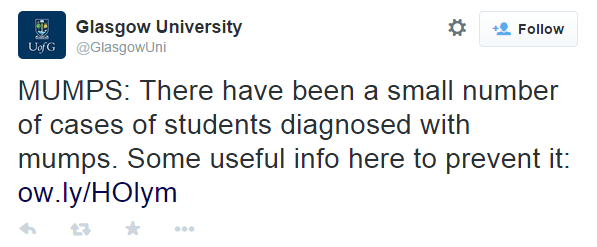Just a day after NHS Lanarkshire, Scotland reported a ten-fold increase in mumps thus far in 2015, the University of Glasgow reports seeing cases in an unspecified number of students.
According to a post on their official Facebook page Friday:
**MUMPS IMPORTANT INFO** There have been a small number of cases of students diagnosed with mumps at UofG. So here’s some useful information.
It’s important to stay at home and rest while the virus runs its course and prevent it spreading. Mumps is a mild condition but if you think you have symptoms seek advice from your GP asap. You should also consider checking whether you have been inoculated which would protect you from contracting it. Again, check with your GP or contact the Barclay medical centre.
Mumps is spread by droplets of saliva or mucus from the mouth, nose, or throat of an infected person, usually when the person coughs, sneezes or talks. Items used by an infected person, such as cups or soft drink cans, can also be contaminated with the virus, which may spread to others if those items are shared.
Symptoms typically appear 16-18 days after infection, but this period can range from 12-25 days after infection. It is usually a mild disease, but can occasionally cause serious complications.
The most common complication is inflammation of the testicles (orchitis) in males who have reached puberty; rarely does this lead to fertility problems.
Other rare complications include inflammation of the brain and/or tissue covering the brain and spinal cord(encephalitis/meningitis), inflammation of the ovaries (oophoritis) and/or breasts (mastitis) infemales who have reached puberty and deafness. Anyone who is not immune from either previous mumps infection or from vaccination can get mumps.
Related: Vaccines: An interview with Dr. Paul Offit
For more infectious disease news and information, visit and “like” the Infectious Disease News Facebook page



2 thoughts on “University of Glasgow reports students with mumps”